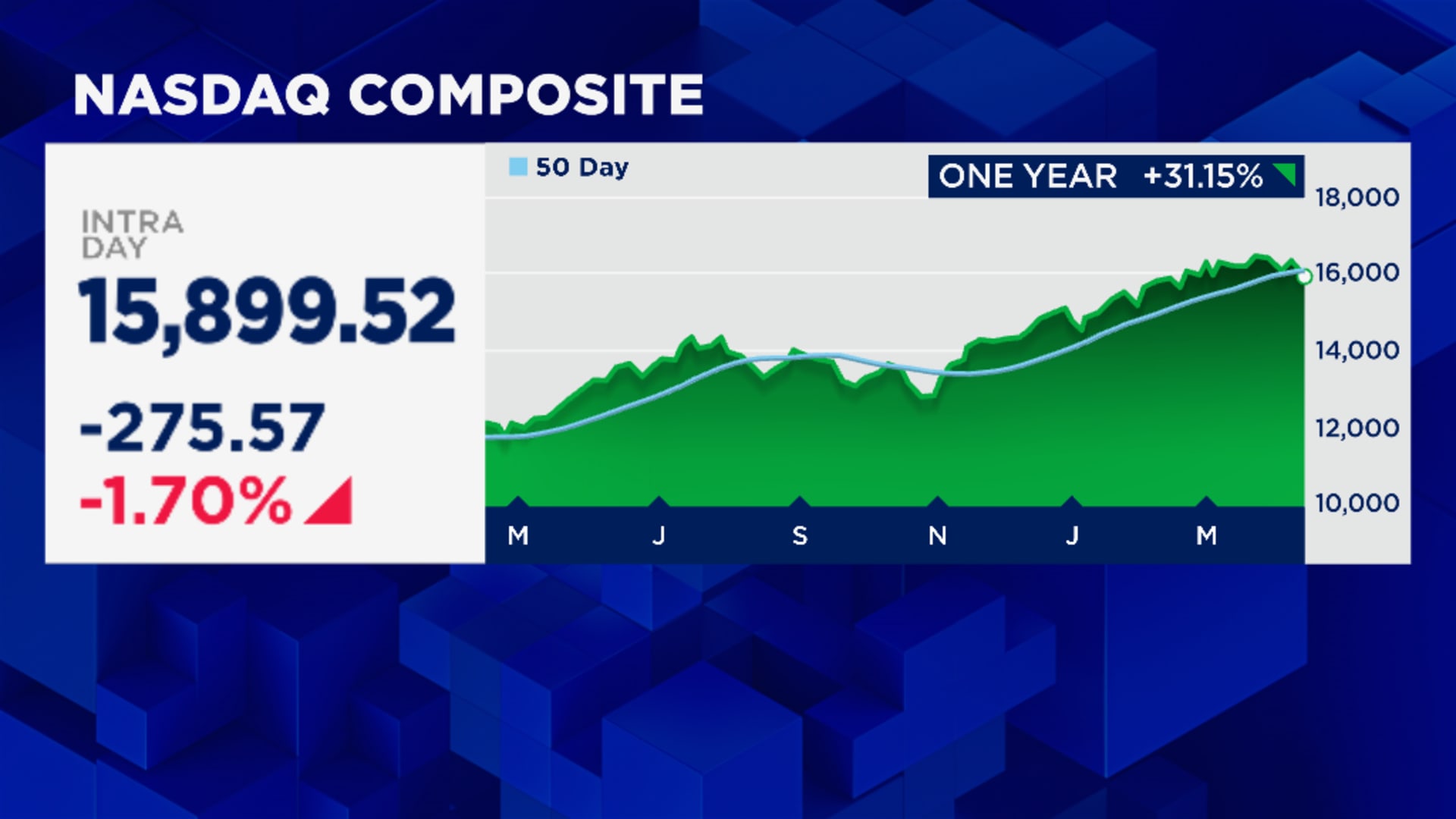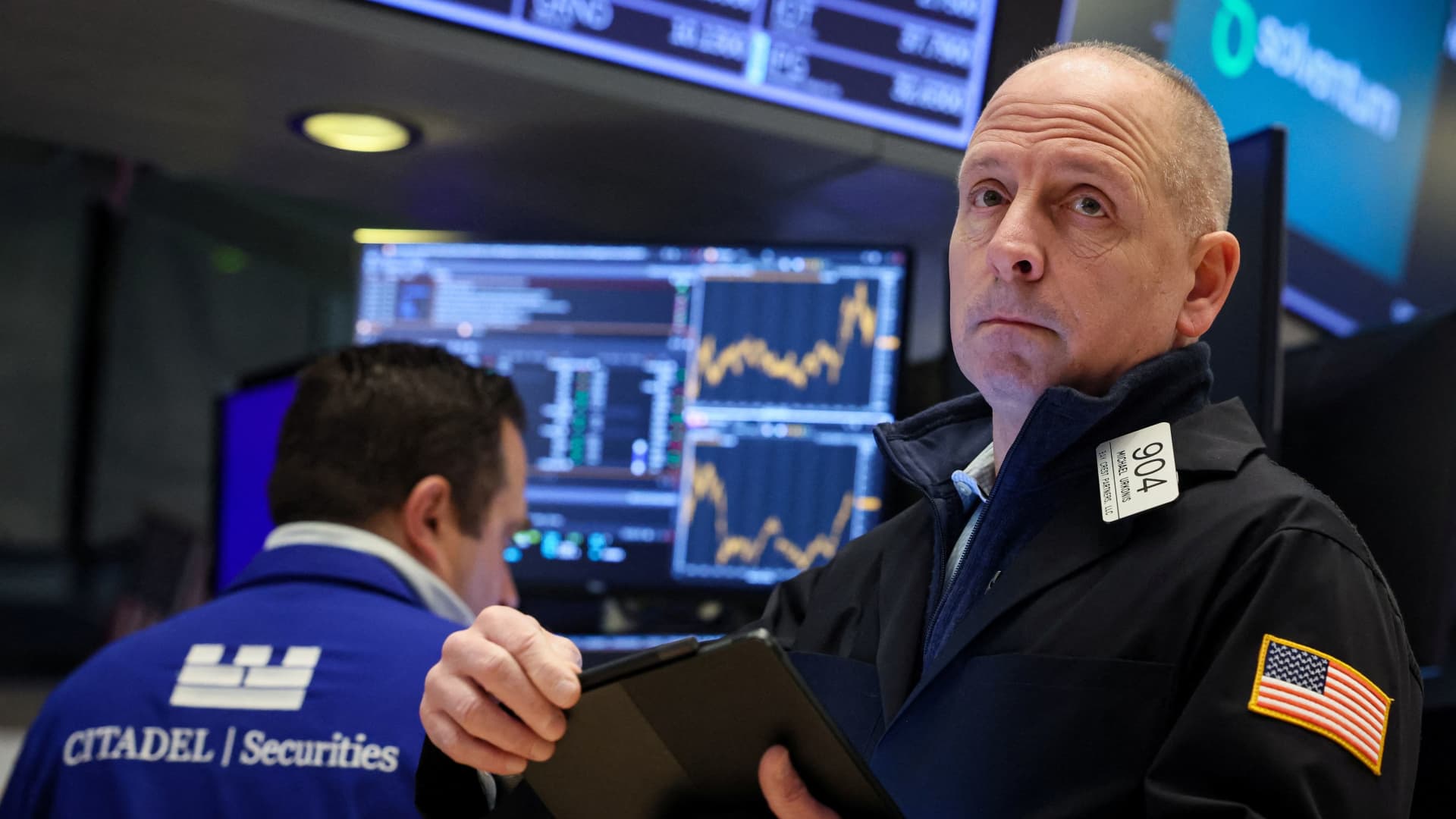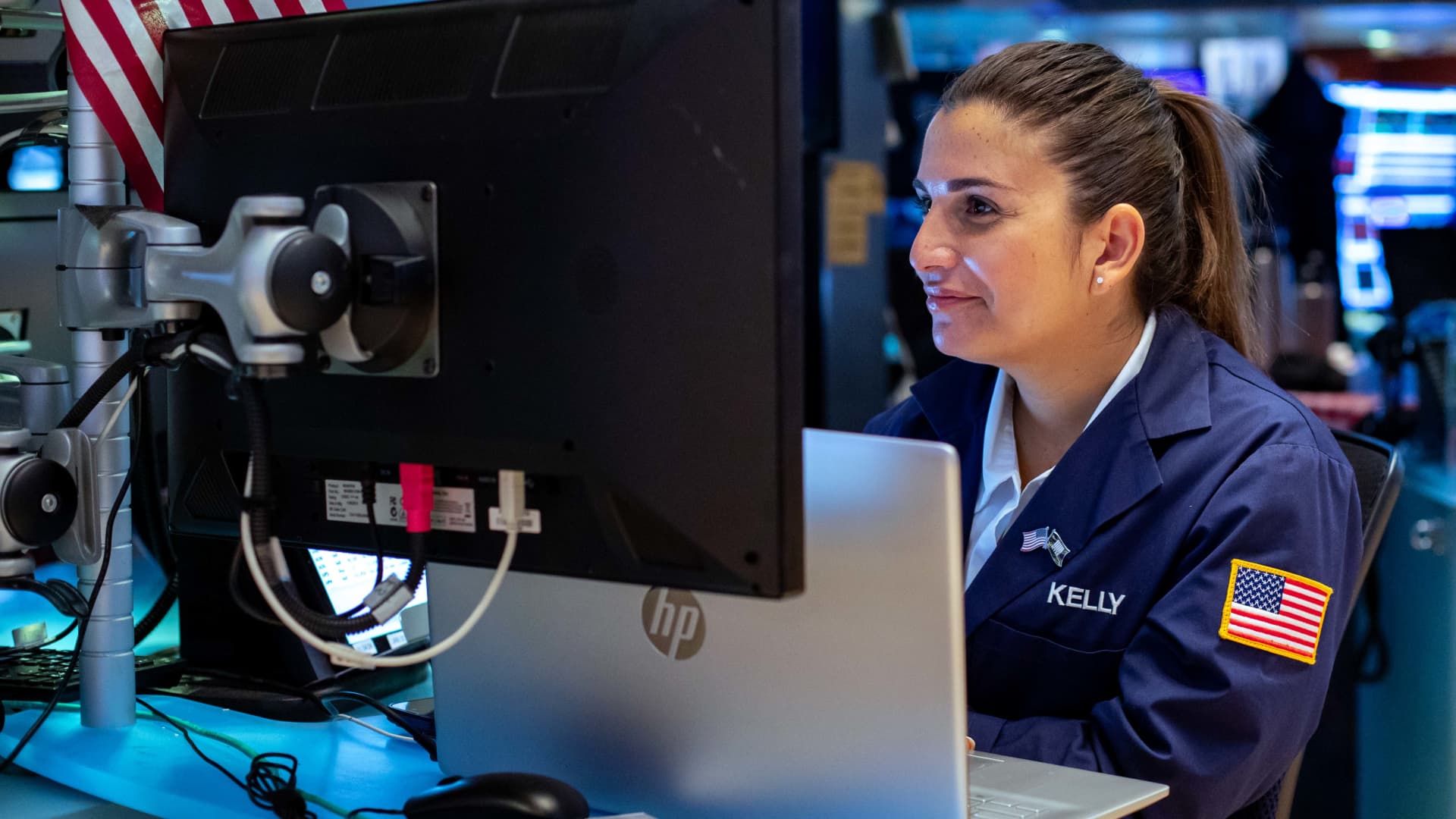
Stocks retreated on Monday as rising yields and worries over the conflict in the Middle East overshadowed strong Goldman Sachs earnings and hot retail sales data.
The Dow Jones Industrial Average lost 248.13 points, or 0.65%, to close at 37,735.11. The 30-stock index relinquished an advance of more than 1% seen early in the session to mark its sixth straight losing day, a streak not seen since June. Monday's losses also pulled the blue-chip average near its 2024 flatline, a stunning turn after trading close to the 40,000 level just weeks prior.
The S&P 500 slipped 1.2% to finish at 5,061.82, despite trading up as much as 0.88% earlier in the session. The Nasdaq Composite tumbled 1.79% to 15,885.02 as Salesforce and other technology stocks dropped.
Higher rates poured cold water on the market bounce seen Monday morning. The yield on the closely followed 10-year Treasury rose above the key 4.6% level in the session and touched its highest point since mid-November.
The Hurricane season is on. Our meteorologists are ready. Sign up for the NBC 6 Weather newsletter to get the latest forecast in your inbox.
Yields popped after data showed retail sales increased 0.7% in March, providing the latest indication that consumption remains strong despite inflationary pressures. That pace was above the 0.3% consensus forecast of economists polled by Dow Jones.
Also weighing on investor sentiment was Iran's launch of drones and missiles at Israel on Saturday night, marking the first direct attack on Israel from Iranian territory. While the majority of threats were intercepted, concerns of retaliation remain. The CBOE Volatility Index, Wall Street's fear gauge, closed at its highest level since October.
"It's really all trading off of news snippets and pieces that are coming out of the Middle East right now," said Alex McGrath, chief investment officer at NorthEnd Private Wealth. "It kind of throws this fear fly into the ointment, so to speak."
Money Report
Oil prices settled lower on Monday, giving up some gains after rising in the weeks leading up to the attack. But the commodity came off lows in afternoon trading, another factor providing downward pressure on the market.
"Historically, geopolitical shocks cause short-term volatility, not long-term market declines," said Emily Bowersock Hill, CEO of Bowersock Capital Partners. "In this current environment, however, the risk of an extended period of volatility is higher, given the inflationary oil price shocks that may emanate from the heightened tensions in the Middle East."
The Dow was led down by Salesforce, which dropped more than 7% on reports that the software company was in talks to acquire data management firm Informatica. On the other hand, fellow Dow member Goldman Sachs popped nearly 3% after beating Wall Street expectations on both lines in the first quarter.
Monday's declines add to the steep losses seen last week, as lingering inflation concerns and a poor start to the new corporate earnings season weighed on traders. Both the Dow and S&P 500 saw their worst weekly performances since last year.
Stocks close lower
The three major indexes finished Monday's session down.
The S&P 500 and Nasdaq Composite tumbled 1.2% and 1.8%, respectively. The Dow slid 0.7%, marking its sixth straight losing day, the longest negative losing streak since June.
— Alex Harring
Five S&P 500 stocks make fresh 52-week lows

There were five S&P 500 stocks making new lows not seen in more than a year on Monday as the index struggled. These include Dow component Boeing, which has plunged more than 30% this year amid safety concerns.
Here is the full list:
- Brown-Forman trading at lows not seen since March 2020
- Walgreens Boots Alliance trading at lows not seen since June 1998
- Biogen trading at lows not seen since September 2022
- Boeing trading at lows not seen since November 2022
- Verisign trading at lows not seen since November 2022
— Sarah Min, Chris Hayes
JPMorgan says earnings beats may not get rewarded
Even if companies can outperform investors' expectations this earnings cycle, their stocks may not see the boost they expect, JPMorgan said.
"The likely earnings beats do not necessarily mean that equities will advance during the reporting season," said Mislav Matejka, head of global and European equity strategy.
According to Matejka, the equity market has already strongly re-rated during the first quarter. Combined with fears over sticky inflation and geopolitical uncertainty, concerns over interest rates "spiking for the 'wrong reason'" are weighing heavily on the market, he added.
— Hakyung Kim
The oil market shrugged Iran's attack. What happens next depends on Israel
The oil market on Monday shrugged Iran's weekend air assault against Israel with U.S. crude and the global benchmark both settling slightly lower.
The West Texas Intermediate contract for May lost 25 cents, or 0.29%, to settle at $85.41 a barrel. June Brent futures fell 35 cents, or 0.39%, to settle at $90.10 a barrel.
The market had already priced in the risk from an attack Iran had telegraphed for days beforehand, and traders breathed a sigh of relief after Israel and the U.S. intercepted nearly all the missiles fired.
What happens next depends on how Israel decides to respond.
"What is not priced into the current market, in our view, is a potential continuation of a direct conflict between Iran and Israel," Maximilian Layton, head of commodities research at Citi, told clients in a note. Oil prices could spike above $100 a barrel depending on how Israel responds to the attack, the analyst wrote.
— Spencer Kimball
Nasdaq Composite slides below its 50-day moving average, a first since November
The major indexes resumed their sell-off on Monday, and the Nasdaq Composite slipped below its 50-day moving average as the index dropped about 1.7%.
It was the first time the tech-heavy index slid below this key threshold since Nov. 3, 2023. If it closes below that level, it will be a first since Nov. 2, 2023. The index is up more than 30% in the past 12 months.

The 50-day moving average is a technical indicator that traders watch to assess short-term trading trends. A close below this level could signal an upcoming downtrend for an asset.
— Darla Mercado, Nick Wells
Barclays senses a pullback on the horizon for risk assets
The macroeconomic backdrop is looking harsh for risk assets, according to Barclays.
In recent weeks, the economy has been dominated by commodities moving higher, while stocks remain at their all-time highs and inflation relents at higher levels. But all these factors combined made for a very worrisome look going forward, with a potential pullback on the horizon, the bank wrote in a Monday note.
"The sticky inflation/stronger USD/higher oil/higher bond yields narrative is not good for risk assets," wrote analyst Ajay Rajadhyaksha. "For the first time in a while, both stocks and bonds look set to underperform, in our view."
— Lisa Kailai Han
Stocks track for losses entering final hour

The three major indexes were on pace to post sizable declines on Monday as the final trading hour commenced.
The S&P 500 and Nasdaq Composite dropped 1.2% and 1.7%, respectively, shortly before 3 p.m. ET. The Dow slipped more than 250 points, which equates to a loss of around 0.7%.
Those slides add to last week's sell-off, which marked the worst weekly performances for the Dow and S&P 500 since the new year began.
All three indexes traded higher earlier in the session. Notably, the Dow was at one point more than 1% in the green.
— Alex Harring
British investment bank sees $100 oil and 10% stock market correction

Turmoil in the Middle East could cause dramatic moves in the financial markets, according to U.K. investment bank Liberum Capital, which is calling for oil to surge to $100 and a stock market correction as big as 10%.
"In our base case scenario of Israel retaliating but in a limited way that keeps the conflict from escalating further, this could lead to a 5-10% correction in the stock market together with further strength in the U.S. dollar," Liberum, founded in 2007, said in a note to clients.
The firm revealed the obvious short-term winners, which include defense contractors.
— Yun Li
Broad sell-off pushes S&P 500 lower
The S&P 500 tumbled in Monday's session, hurt by a wide range of sliding stocks.
All 11 sectors that comprise the broad index were down shortly before 2:25 p.m. ET. As a whole, the index fell more than 1%.
Real estate was the worst-performing sector with a drop of 1.8%. Communication services and information technology, which are both technology-heavy groups, were the next-biggest losers, as each declined more than 1.5%.
Health care saw the smallest losses of the group, inching down just around 0.1%.
— Alex Harring
Clean energy ETF reaches worst price since 2018
The Invesco WilderHill Clean Energy ETF (PBW) fell to its lowest level since 2018 on Monday.
The fund was last down almost 2.5% in the session. At one point in the trading day, it traded at its cheapest price going back to December 2018.
Polestar, a Swedish electric vehicle manufacturer, led the exchange-traded fund down with a drop of about 11%. SunPower and Navitas were the next-biggest losers, falling more than 8% and 7%, respectively.
However, some names were able to buck the fund's slide. Most notably, Piedmont Lithium jumped more than 20%, while SES AI rallied more than 15%.
— Alex Harring, Gina Francolla
Goldman Sachs restricts losses for Dow
Goldman Sachs' post-earnings rally helped mitigate slides seen elsewhere within the Dow.
The financial giant climbed more than 3% during Monday's session. With that gain, it was performing the best of the 30 stocks that comprise the blue-chip average.
Goldman said it earned $11.58 per share on revenue of $14.21 billion in the first quarter, topping respective estimates from analysts polled by LSEG of $8.56 a share and $12.92 billion. The firm was helped by growth in trading and investment banking revenue.
Intel and UnitedHealth were the next-biggest gainers, with each rising more than 2%.
The index was on pace to finish around flat despite those gains, hurt by slides of more than 5% in Salesforce and 1% in Honeywell. But it was still the best performer of the three major indexes in the session.
— Alex Harring
See the stocks making the biggest midday moves

These are some of the names making headlines in midday trading.
- Tesla — Shares fell 2.8% after an internal memo said the electric vehicle maker is planning to lay off more than 10% of its global workforce. "As we prepare the company for our next phase of growth, it is extremely important to look at every aspect of the company for cost reductions and increasing productivity," CEO Elon Musk said in the memo.
- Reddit — Shares dropped more than 5% after Wall Street firms initiated coverage of the stock following its public debut last month. Morgan Stanley initiated coverage of the social media platform at equal weight, saying shares are already trading at fair value. JPMorgan and Goldman Sachs each gave Reddit a neutral rating. Others, including Deutsche Bank, were more bullish on the stock.
- Logitech — Shares dropped 6.4% after Morgan Stanley downgraded the computer peripherals stock to underweight, saying the market is "mis-pricing" the company's "future growth algorithm."
For the full list, read here.
— Pia Singh
Hong Kong ETF falls to lowest level since 2011
The iShares MSCI Hong Kong ETF (EWH) dropped 0.7% Monday, falling to its lowest level since December 2011. Casino group Sands China and Galaxy Entertainment led to the downside, with both stocks down around 4.6% and 2.8%, respectively. AIA Group was also down nearly 3% and among the biggest decliners.
Year to date, the exchange-traded fund is down 13.3%, and is down 27.5% over the past 12 months.
— Hakyung Kim, Gina Francolla
Salesforce heads for worst day since 2022
Salesforce shares were poised to see their biggest loss in a session going back to late 2022 following acquisition reports.
The software stock dropped more than 5.5% during Monday morning trading, making it the worst performer in the Dow. The last time the stock saw a bigger slide in one day was early December 2022, when shares fell more than 7%.
Monday's retreat came after The Wall Street Journal and Reuters reported that Salesforce is in talks to acquire data management firm Informatica. Despite the pullback, shares are still up more than 5% in 2024.
Salesforce's slide also weighed on the technology-heavy Nasdaq Composite, which was the worst performer of the three major indexes on Monday.
— Alex Harring
Dollar hits highest level since November
The dollar index on Monday hits its highest level since November as the yen weakened and as tensions escalated in the Middle East.
The dollar index hit a high of 106.013, or its best level going back to Nov. 3, 2023, when the index had reached 106.224. The dollar hit a high of 154.4 against the yen, the highest level since June 29, 1990, when the dollar traded as high as 154.58 against the yen.
The dollar also reached a high of 0.9151 against the Swiss franc, which was the highest level since Oct. 6, 2023, when the dollar went as high as 0.9175 against the franc.
— Sarah Min, Gina Francolla
Market risk could be lower than initially expected following Iran attack, Evercore ISI says

Concerns for traders tied to the Middle East conflict may be coming down after Iran's attack on Israel over the weekend, according to Evercore ISI.
"This remains a dangerous situation, but risks to oil and markets may be a bit less than feared Friday on the eve of the attack," said Krishna Guha, the firm's senior managing director, in a Sunday note.
How Israeli Prime Minister Benjamin Netanyahu will respond to the attack is a key outstanding question, Guha said. The Biden administration has made it clear it does not want Israel to retaliate, he noted.
"Provided that Netanyahu looks like he is willing to follow U.S. advice, there may be some element of a relief rally in markets Monday," Guha said. "However, our colleagues in the energy team do not expect a big retracement in the price of oil."
— Alex Harring, Hakyung Kim
Tesla falls after company says more than 10% of workforce will be laid off
Tesla shares were down more than 3% after the electric vehicle maker said it would lay off more than 10% of its global workforce.
"There is nothing I hate more, but it must be done. This will enable us to be lean, innovative and hungry for the next growth phase cycle," CEO Elon Musk said in a memo.
— Fred Imbert
Stocks open higher

Stocks kicked off Monday's trading session in the green as Wall Street looked to rebound off last week's sell-off.
The Dow traded more than 350 points higher, which equates to about 1%, shortly after 9:30 a.m. ET. The S&P 500 and Nasdaq Composite rose 0.8% and 0.5%, respectively.
— Alex Harring
Stocks come off losing week
The three major indexes have ground to make up after last week's drops.
The Dow fell more than 2%, marking its second down week in a row and biggest loss since March 2023. A sizable chunk of that sell-off came Friday, when the blue-chip index tumbled around 475 points.
The S&P 500 ended the week lower by about 1.5%, its worst performance since October 2023. Friday saw the biggest drop for the broad index since January.
The technology-heavy Nasdaq Composite finished almost 0.5% in the red. That was its third straight losing week, a negative streak last seen in October 2023.
— Alex Harring
Trump Media shares drop after filing to issue more stock

Shares of Trump Media plunged more than 17% during premarket trading after the company filed to issue millions of additional shares of stock.
The company behind the Truth Social app said in a filing that it will issue up to an aggregate of 21,491,251 shares of its common stock, which trades under DJT on the Nasdaq.
— Yun Li
Stocks making the biggest moves before the bell: Goldman Sachs, Snap One and more
These are some of the stocks moving the most during premarket trading.
- Goldman Sachs — Goldman Sachs shares jumped 3.3% during premarket trading after the company beat Wall Street's first-quarter earnings expectations.
- Snap One — Snap One shares surged 30% after the provider of smart living products said it was going to be acquired by Resideo Technologies, a home automation company, for $10.75 per share in cash.
- Salesforce — Shares slid nearly 3% during premarket trading, following reports from The Wall Street Journal and Reuters that the software company is in advanced talks to acquire Informatica, a data management firm.
Read the full list of stocks moving here.
— Lisa Kailai Han
Retail sales data comes in above economists' forecast

Stock futures took a leg up after retail sales data came in hotter than anticipated for March.
U.S. Census Bureau data showed the measure increased 0.7% for the month. That is a higher rate than the Dow Jones consensus forecast for a 0.3% increase, underscoring the trend of continued consumption despite higher prices in the U.S.
— Alex Harring, Jeff Cox
Tesla dips following layoff reports
Tesla retreated more than 1% during premarket trading on the back of media reports showing the electric vehicle maker will cut more than 10% of its workforce.
CNBC has not been able to independently verify a memo cited by other outlets and has reached out to the company for comment. Tesla shares have tumbled more than 30% in 2024.
— Alex Harring, Ruxandra Iordache
Goldman shares gain more than 3% on earnings beat

Goldman Sachs shares jumped 3.3% in premarket trading after the company surpassed first-quarter earnings expectations, fueled by its trading and investment banking businesses.
The financial titan posted earnings of $11.58 per share on revenue of $14.21 billion for the period, while Wall Street analysts surveyed by LSEG had called for earnings of $8.56 per share on revenue of $12.92 billion.
Dormant capital markets and the company's push into retail banking, which it has pivoted away from, should lead to stronger results this year for the financial giant. Goldman's new emphasis for growth has centered on its asset and wealth management division, which could see gains given the market rally earlier this year.
— Pia Singh, Hugh Son
Gold rebounds after Friday sell-off as Iran-Israel tensions spur safe-haven demand

Gold climbed on Monday as investors sought safe-haven assets following Iran's drone and missile strike on Israel over the weekend.
Spot gold prices climbed 0.61% to trade at $2,356.34 per ounce, rebounding after a retreat from all-time highs on Friday.
Gold futures for April rose 0.1% to trade at $2,358.5.
— Lim Hui Jie
Oil stocks in Asia mixed after Iran drone strikes against Israel
Oil stocks in Asia were mixed following Iran's drone strike against Israel over the weekend, while oil futures were little changed.
Australian oil heavyweight Woodside Energy inched up 0.1%, while counterparts Santos and Beach Energy gained 0.38% and 1.02%, respectively.
In Japan, Japan Petroleum was one of the largest gainers on the Nikkei 225, up 3.08%, while Eneos Holdings rose 0.32%. Heavyweights Inpex and Cosmo Energy, however, fell 0.29% and 0.58%, respectively.
South Korean oil stocks were also mixed, with the largest oil stock by market cap on the Kospi SK Innovation down1.29%. Counterpart S-Oil, which is the second-largest South Korean stock, rose 2.04%.
— Lim Hui Jie
Japan machinery orders in February surpass expectations
Japan's core machinery orders beat expectations by a large margin in February, rising 7.7% month on month compared with the 0.8% rise expected by economists polled by Reuters.
However, on a year-on-year basis, core machinery orders were down 1.8%, a smaller drop than the 6% decline forecast in the Reuters poll.
Core machinery orders are a highly volatile data series, regarded as a leading indicator of capital spending in Japan.
— Lim Hui Jie, Reuters
Oil prices fall slightly after Israel fends off large-scale aerial attack by Iran

U.S. crude oil futures were slightly lower Sunday as traders breathed a sigh of relief after Israel fended off a large-scale air assault by Iran and the U.S. emphasized it wants to avoid a wider war in the Middle East.
The West Texas Intermediate contract for May lost 34 cents to $85.32 a barrel as trading began Sunday evening. June Brent futures eased slightly to $90.18 a barrel. U.S. crude closed at $85.66 a barrel Friday, while the global benchmark settled at $90.45. WTI futures began the year around $71 a barrel.
Iran launched more than 300 drones and missiles against military targets in Israel on Saturday in an attack that President Joe Biden described as "unprecedented." Though significant in scale, the Iranian attack caused little actual damage in Israel.
— Spencer Kimball
Cryptocurrencies fall on increased Middle East tensions
Bitcoin and other cryptocurrencies sold off heavily Saturday night after Iran launched an unprecedented drone and missile attack on Israel.
As of Sunday evening, bitcoin was trading near $65,000. It managed to rebound partially from its losses on Saturday, when it fell below $62,000 from around $70,000. This marked the steepest sell-off for bitcoin in over a year.
Other coins such as ether also saw heavy selling, down by up to 10% in some cases.
— Hakyung Kim, Matt Clinch
Stock futures open flat Sunday
U.S. stock futures were little changed Sunday night.
Dow Jones Industrial Average futures traded near the flatline. S&P 500 futures ticked up 0.02%, while Nasdaq 100 futures inched down 0.03%.
— Hakyung Kim
First direct attack on Israel from Iranian territory on Saturday

Iran fired 300 drones and missiles toward Israel on Saturday night in retaliation for a suspected Israeli strike killing top Iranian officials in Syria. The strike was the first direct attack on Israel from Iranian territory.
The Israeli government said it identified 300 types of drones and missiles, and managed to intercept "99%" of those bound for Israeli territory, per an Israel Defense Forces spokesperson.
— Hakyung Kim






